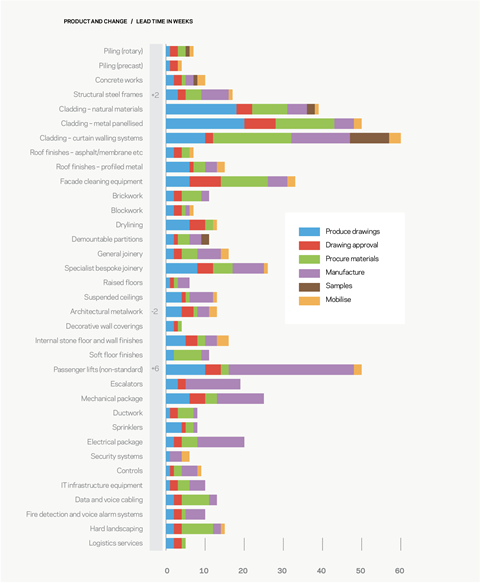The past quarter has again shown little movement, with lead times static for all but three packages. Despite uncertainty over the future, most firms forecast no rise in lead times. Brian Moone of Mace Business School reports
01 / Going up
▲Structural steel frames
▲ Passenger lifts –- non-standard
02 / Staying level
▶ Piling (precast)
▶ Rotary piling
▶ Concrete works
▶ Structural steel frames
▶ Cladding – natural materials
▶ Cladding – metal panellised
▶ Cladding – curtain walling systems
▶ Roof finishes – asphalt/membrane
▶ Roof finishes – profiled metal
▶ Facade cleaning equipment
▶ Brickwork
▶ Blockwork
▶ Drylining
▶ Demountable partitions
▶ General joinery
▶ Specialist joinery
▶ Raised floors
▶ Suspended ceilings
▶ Architectural metalwork
▶ Decorative wall coverings
▶ Internal stone floor and wall finishes
▶ Soft floor finishes
▶ Escalators
▶ Electrical package
▶ Mechanical package
▶ Ductwork
▶ Sprinklers
▶ Security systems
▶ Controls
▶ IT infrastructure equipment
▶ Data and voice cabling
▶ Fire detection and voice alarm systems
▶ Hard landscaping
▶ Logistics services
02 / Going down
▼Architectural metalwork
04 / Lead times summary
Rotary piling ▶ lead times remain at seven weeks with no change anticipated over the next six months. Precast piling ▶ lead times remains at four weeks, with no change in lead times expected over the next six months. Concrete works lead times remain at 10 weeks; enquiry levels and workload remain static and contractors do not anticipate any change over the next six months. Structural steel frames ▲ lead times have increased by two weeks to 17 weeks with future order levels unchanged.
Cladding – natural materials ▶ lead times remain at 39 weeks and workload and enquiries remain at a consistent level with no change forecast for the next six months. Cladding – metal panellised ▶ lead times remain at 50 weeks, with some companies continuing to report increased workload and enquiry levels. Increases continue to be forecast in the next six months. Cladding – curtain walling systems ▶ lead times remain at 60 weeks. Although companies are generally busier, enquiries are quieter than six months ago, and they do not anticipate lead times changing in the next six months.
Roof finishes – asphalt/membrane ▶ lead times remain at seven weeks. With enquiries and workload remaining consistent, contractors do not anticipate lead times changing in the next six months. Roof finishes – profiled metal ▶ lead times remain at 15 weeks. Workload remains the same, but enquiries are quieter than six months ago and no change in lead times is anticipated in the next six months.
Facade cleaning equipment ▶ lead times remain at 33 weeks; contractors continue to be busier, with increased enquiries compared with six months ago, but do not anticipate any change over the next six months.
Brickwork ▶ lead times remain at 11 weeks, with no change anticipated over the next six months. Blockwork ▶ lead times remain at seven weeks, and companies do not expect lead times to increase over the next six months, with workload and enquiries steady. Drylining ▶ lead times remain at 13 weeks. No change is expected for the next six months.
Demountable partitions ▶ lead times remain at 11 weeks, with companies reporting consistent workload and enquiry level. General joinery ▶ lead times remain at 16 weeks; anticipated increases in workload have not materialised, therefore no further increases in lead times are expected in the next six months. Specialist joinery ▶ lead times remain at 26 weeks and despite increases in workload and enquiries no change is expected over the next six months.
Raised floors ▶ lead times remain at six weeks, workload and enquiries are down, but no changes to lead times are forecast in the next six months. Suspended ceilings ▶ lead times remain at 13 weeks.
Architectural metalwork ▼ lead times have reduced by two weeks to 13 weeks due to reduced workload compared with last quarter. Lead times for decorative wall coverings ▶ remain at four weeks, with no change anticipated in the next six months. Internal stone floor and wall finishes ▶ lead times remain at 16 weeks. Enquiry levels and workload remain stable and no change in lead times is forecast in the next six months. Soft floor finishes ▶ lead times remain at 11 weeks. Increases in lead times continue to be anticipated over the next six months due to materials availability issues.
Passenger lifts (non-standard) ▲ lead times have increased by a further six weeks to 50 weeks, after a steady pattern of increases in the last 12 months due to companies being busier. No further increase in lead times is anticipated in the next six months. Escalators ▶ lead times remain at 19 weeks.
Electrical package ▶ lead times remain at 20 weeks. There are signs of an increase in workload and enquiries, with some companies continuing to forecast an increase in lead times over the next six months. Mechanical packages ▶ lead times remain at 25 weeks, with no change expected in the next six months. Ductwork ▶ lead times remains at eight weeks, with workload and enquiry levels remaining static. No change is forecast for the next six weeks. Sprinklers ▶ lead times remain at eight weeks; contractors’ workloads remains consistent and they do not forecast an increase in lead times over the next six months.
Security systems ▶ lead times remain at six weeks, with no change forecast. Controls lead times remain at nine weeks. IT infrastructure equipment ▶ lead time remain at 10 weeks. Fire detection and voice alarm systems ▶ lead times have been restated at 10 weeks to reflect improved data. Hard landscaping ▶ lead times remain at 15 weeks. Logistics services ▶ lead times remain at five weeks.
Despite uncertainty about the future workload most companies are not forecasting changes to their lead times, with only two packages increasing and one package decreasing.
























No comments yet